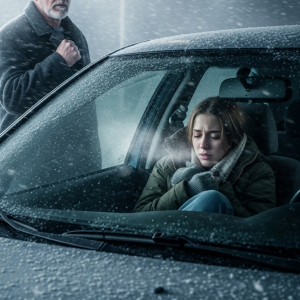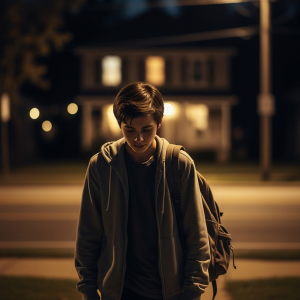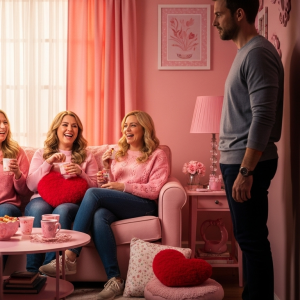I always knew I was unwanted. This isn’t the dramatic angst of a teenager feeling misunderstood; it’s a fact my parents stated plainly. “We wish we’d only had one,” they’d say, their eyes on my twin sister, Sarah. I wasn’t a surprise; I was an unwanted bonus item they never asked for.
Growing up was like being a ghost in someone else’s family portrait. Sarah was the star, the princess in a room adorned with pink curtains and Disney bedspreads, her shelves overflowing with toys. My room was a cramped afterthought, furnished with a squeaky bed and a dresser that smelled of dust and neglect. I was the extra in the background of her perfect life.
Every morning, I’d wake to the sound of my parents excitedly planning Sarah’s day—new clothes, gymnastics, playdates. My existence was an inconvenience. The most common phrase I heard was, “Why can’t you be more like your sister?” It felt more like my name than my own.
At school, the story was the same. During parent-teacher conferences, they’d marvel at Sarah’s finger paintings as if she were a prodigy. When my teacher presented my stellar report card, they wouldn’t even glance at it. My achievements were invisible, overshadowed by her mere presence. She was the golden child, and I was just… there.
The disparity was in every detail. Her closet was a boutique of new outfits for every season; my wardrobe consisted of hand-me-downs from distant cousins. At Christmas, she’d be showered with mountains of gifts. I’d receive one or two token items, just enough for them to claim they hadn’t forgotten me. I mastered the art of the fake smile, the silent swallow of bitterness.
But it was the little things that cut the deepest. Sarah’s toys were sacred. If I so much as breathed on one of her dolls, she’d shriek, and my parents would materialize to scold me for not respecting her space. At dinner, she always got the first and best portion. My mother’s cold refrain to any complaint was, “Be grateful you’re getting anything at all.”
The only person who saw me was my grandfather. He’d take me fishing and tell me stories, making me feel like I mattered. For a few precious hours each week, I was a normal kid, not the shadow of a favored twin. But then he got sick, and my parents used his illness as another tool of exclusion.
They took Sarah to visit him, but I was always told to stay home. I started sneaking out to see him on my own. He’d tell me how proud he was of me, his voice weak but his eyes full of a warmth I saw nowhere else. When he passed, that one light in my life went out. At the funeral, they stood at the front with Sarah. I was pushed to the back, an embarrassing secret they couldn’t quite hide.
After he was gone, I faded even further into the background. In family photos, I was an elbow or the back of a head. The resentment festered inside me, a quiet poison. I learned to keep my mouth shut, to blend into the wallpaper. Because being invisible was better than being a disappointment.
I turned sixteen with one goal: survive two more years and get out. I was counting down the days, but I wasn’t prepared for how quickly my exit would be accelerated. My family always favored my sister, but what they did next was a new level of cruel. It’s one thing to feel like you don’t belong; it’s another to be physically thrown out.
Sarah got pregnant. She was sixteen, and the father was a nineteen-year-old with no prospects. I expected a lecture, consequences, a dose of reality. Instead, my parents were thrilled. “We’re going to be grandparents!” they chirped, acting as if she’d won a Nobel Prize. It was surreal.
They threw together a shotgun wedding so fast it felt like a fever dream. One minute, I was hiding in my room, the next I was being told to get dressed for the ceremony. A few weeks later, my mother called me downstairs, wearing a smile I’d learned to dread. It was her prelude-to-bad-news smile.
“With the new baby coming, we’re going to need more space,” she said, her tone deceptively sweet. I braced myself. “We need your room for the nursery.” The words hung in the air, cold and final. My room—the one small, shabby space that was mine—was being requisitioned.
“What am I supposed to do?” I stammered, stunned. My mother shrugged, her expression devoid of sympathy. “You’re sixteen. You’re old enough to figure it out. Be grateful we let you stay this long.” My dad stood behind her, arms crossed, a silent enforcer. “It’s time you take responsibility for yourself, son,” he added, as if kicking out a child was a lesson in character-building.
That night, I packed my few belongings: some clothes, books, and the small keepsakes from my grandfather. I was out on the street, and their only concern was making room for their precious grandchild. I grabbed an old tent from the garage and pitched it in the backyard. It was all I had. I could hear them inside, laughing and planning, completely oblivious to the son they’d just made homeless.
Winter arrived, and the cold was relentless. I did my homework by flashlight, shivering under thin blankets, my grades plummeting. It’s hard to focus on algebra when you’re freezing. I was a ghost haunting my own backyard, watching through the kitchen window as they lived their perfect life, just a few feet away from my suffering.
I took odd jobs, shoveling snow and mowing lawns, saving every dollar for food. The worst part was knowing my grandfather would never have allowed this. Without him, I was utterly alone. One night, listening to the wind howl, I made a decision. I was done trying to earn their love. If they didn’t want me, fine. I would find a way out, and I would do it myself.
Desperate and freezing, I knew I couldn’t survive in that tent much longer. One afternoon, I found myself outside a local bakery, drawn in by the smell of fresh bread. The owner, a gruff old man named Frank, came out and saw me lingering. “You looking for work, kid?” he asked, his voice like gravel. I nodded without hesitation.
He needed a cleaner and a delivery boy. The pay was cash, plus day-old bread. It felt like winning the lottery. My first shift started at 4 a.m., but the moment I stepped into the warmth of the bakery, I knew I could do this. The work was grueling, but for the first time, I had a purpose. It felt good to be useful.
Frank wasn’t a talker, but over time, he opened up. He told me his own father had kicked him out as a teenager, and he’d built the bakery from nothing. I think he saw a kindred spirit in me. He started teaching me how to budget, then how to bake. It was strange, but this gruff stranger showed me more kindness than my own family ever had.
After a few weeks, Frank offered me a small storage room above the bakery. It was tiny and bare, but it was warm, and it had a roof. I moved my things in that night and slept soundly for the first time in months. I poured all my energy into the job, determined to prove Frank’s faith in me wasn’t misplaced.
One day, he handed me an envelope. “You’ve been doing good work, kid,” he grunted. “Here’s your first proper paycheck.” It was more money than I’d ever held. For the first time, I felt like I was moving forward, not just surviving. The bakery became my sanctuary and my stepping stone.
I saved every penny, living frugally. I started taking on more work, picking up shifts at a convenience store and doing landscaping on weekends. Frank never pried into my past, but one night he handed me a set of keys to the bakery. “In case you ever need to lock up,” was all he said, but I knew it was a gesture of trust. In his own silent way, Frank was looking out for me. I was building a new life, one loaf of bread at a time.
Years of relentless work paid off. I bought my own house—a modest three-bedroom place, but it was mine. Walking through the door for the first time, keys in hand, was a feeling I can’t describe. I stood in the empty living room and felt a surge of pride. I had done it, entirely on my own.
Just as I was starting to feel settled, my doorbell rang. Standing on my porch were my parents, Sarah, her husband, and their three children. They were all smiling, as if the past decade of my life hadn’t happened, as if they hadn’t left me to freeze in a tent.
“Surprise!” my mother chirped. “We heard you bought a house. We’re so proud of you.” I gripped the doorknob, my knuckles white. This wasn’t a social call; they wanted something. My father cleared his throat. “Son, we were thinking… with Sarah’s family growing, and you having all this space… maybe it’s time to let bygones be bygones.”
I almost laughed. “What do you want?” I asked, my voice flat. My mother’s smile widened. “Well, we thought, wouldn’t it be lovely if we all moved in here? One big, happy family, just like old times!” She said it so casually, as if asking for a cup of sugar, not the home I had bled and sweat for.
The memories flooded back—the cold, the hunger, the loneliness. The anger I had buried for years began to surface. “No,” I said, my voice steady despite the rage shaking my hands. “That is not happening.” Their smiles vanished. “But we’re family,” my mother insisted, as if that word was a magic key.
“Where was that attitude when I was sixteen and sleeping in your backyard?” I shot back. My dad’s face reddened. “Now listen here—” “No, you listen,” I interrupted, my voice rising. “I built this life without you. This is my home, and you are not welcome here.”
Sarah stepped forward, her face a mask of fake hurt. “Don’t be so selfish. We need this. You owe us.” That was the final straw. “Owe you?” I snapped. “I don’t owe you anything. You threw me out. You left me with nothing. Get out.”
My mom tried one last time, her voice dripping with false sincerity. “We just want to be a family again.” “You want to be a family now that I have something you want,” I said, the truth of it hanging between us like a guillotine. They finally left, defeated. As their car drove away, I leaned against my closed door, a strange mix of relief and sorrow washing over me. I had finally stood up for myself.
I was wrong to think they would give up so easily. A few weeks later, an official-looking envelope arrived. It was a legal notice. My sister was contesting my ownership of the house, claiming it should be considered shared ‘family property.’ The audacity was breathtaking.
My lawyer was blunt. “They don’t have a case, but they’ll make your life hell trying.” And they did. They launched a smear campaign, telling old family friends I had stolen money from them to buy the house. Suddenly, I was the ungrateful villain who had taken advantage of their generosity.
But I wasn’t that scared kid anymore. I fought back, gathering every document that proved my hard work. Then, I decided to go on the offensive. I asked my lawyer to dig into my family’s finances, to find out where they got the audacity. A few weeks later, she called me into her office. What she’d found changed everything.
My grandfather, the only person who ever loved me, had left me a substantial inheritance. It was meant for me when I turned eighteen. But my parents had gained control of it through a legal loophole and had been bleeding it dry for years. They used it to pay their debts, fund Sarah’s wedding, and support her husband’s failed businesses.
They had let me freeze in a tent while they spent my money. All those years I thought I was worthless, they were using me as their secret bank account. The betrayal was so profound it left me breathless. They wanted to take my house? I was going to take back everything they had stolen from me.
We countersued for fraud and theft. In court, they tried to paint me as a monster, but the evidence was undeniable. Document after document showed how they had systematically plundered my inheritance. Watching them squirm on the stand, their lies unraveling, was the first time I felt powerful.
The judge ruled in my favor. They had to pay back every cent, plus damages. The look of pure shock on their faces was a victory in itself. For the first time, they couldn’t lie their way out of the consequences. Leaving the courthouse, I felt a sense of closure I had never known. It was never about the money. It was about justice.
They’ve tried to reach out since the verdict, offering hollow apologies now that their comfortable life has been upended. But I know better. Apologies only offered under duress are just another form of manipulation. I blocked their numbers and cut all ties for good.
Now, my life is quiet. I have my house, my job, and a future I built from the ashes of my childhood. There are still scars, but they are reminders of my own strength, not their cruelty.
I’ve learned that family isn’t about blood. It’s about who shows up for you when you have nothing, who offers you a key when you’re locked out in the cold. I found more family in a gruff baker than I ever did in the people who were supposed to love me. The future is uncertain, but it’s mine. And I will never again let anyone take that away from me.




